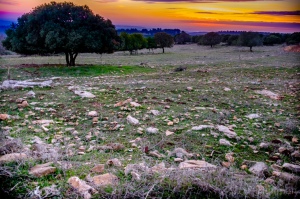So What, Exactly, is Tu Bishvat?
 The evening of January 24th marks the start of Tu Bishvat this year. The name means the 15th day of the Hebrew month of Shevat, and it refers to the so-called “new year of the trees.”
The evening of January 24th marks the start of Tu Bishvat this year. The name means the 15th day of the Hebrew month of Shevat, and it refers to the so-called “new year of the trees.”
Why do trees need a new year?
For an answer we turn to the Talmud — that great compilation of Jewish laws and lore from the middle of the first millennium CE. The section called “Rosh Hashana” (“New Year”) starts with the intriguing claim that “there are four new-year days.” And it turns out they fall in the months of Nissan, Elul, Tishri, and Shevat.
The new year with which we are now most familiar — Rosh Hashana — falls in Tishri, which, as it happens, is the seventh month of the year. Certainly the year ought to begin with the first month, so we know we have some digging to do.
The first month is Nissan. Passover falls on the 15th day of this month, and the first day is what the Talmud calls the new year for kings and festivals.
Elul is the sixth month, usually overlapping August and September in our calendar. The first of Elul is the new year for the cattle-tithe.
After Elul comes Tishri, the first day of which is New Year’s Day. As we just just saw, this puts the Jewish new year in the middle of the Jewish year.
And then we get to Shevat, the 11th of the 12 months in the Jewish year. The Talmud advises that some people thought that the 1st day of Shevat was the new year for trees, but the prevailing opinion relegated that status to the 15th day of the month.
Fine. So we have, working our way through the year, the new year for kings (in the 1st month, a couple of weeks before Passover), the new year for cattle-tithes (in the 6th month), New Year’s Day (on the first day of the 7th month), and then the new year for trees in the 11th month.
The Talmud explains why kings need their own new year, starting with a cryptic answer: “on account of documents.” It turns out that documents such as mortgages were dated according to the year of a king’s reign — as in, “during the second year of the reign of King So-and-So.” The question is when that second year commences. Is it on the anniversary of his ascension to the throne? No. It’s on the new year for kings. So along with each first day of Nissan there begins a new year for reckoning time according to the reign of kings.
What about the cattle-tithe new year? It used to be that people would pay yearly taxes of a sort based on how many animals they had. To implement this system, an arbitrary cut-off date for counting the animals was required. For instance, you might have 15 heads of cattle on one date, and 20 an another. At what point would you pay for the additional animals? The answer is that the 1st of Elul was the cut-off date. You paid taxes each year on however many animals you owned on Elul 1. (The IRS uses the same principle in calculating income tax. Tax on money earned up to December 31 of one year is due by April 15 of the next year.)
Similar reasoning applies to the new year for trees. Taxes were paid on fruit trees. A tree whose fruit was fully formed before Tu Bishvat of a given year was taxed in its entirety during that year; if the fruit formed thereafter, it was taxed in the next year.
Of course, we no longer reckon our years by kings and no longer pay tithes on the animals or on the fruit trees that we own. (And in any event, my animals number zero each year.) So why should we care?
Beyond the interesting if now-irrelevant details, and the spotlight on our history, we find meaningful customs that have come to accompany the different new years. On Tu Bishvat, for instance, we now pause to honor trees and nature in general.
In addition, we learn that our lives have more than one yearly cycle. Natural patterns commence around Passover, with the onset of spring, just as things like school calendars begin in the fall, and our official American calendar resets in the middle in winter. And thanks to a long sequence of interpretation, January 24 marks yet another fresh start.
Happy new year.



